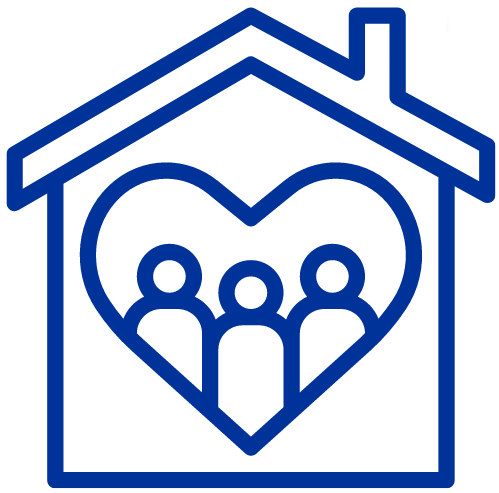Help us protect Louisiana's children. Call 1-855-4LA-KIDS (1-855-452-5437) toll-free, 24 hours a day, seven days a week.
Report Child Abuse & NeglectFoster Care Navigator
FOSTER CARE NAVIGATOR
Welcome to our Foster Care Navigator page! Whether you're considering becoming a foster caregiver, looking to support our incredible foster families, or exploring resources for kinship care, you're in the right place. This space is a friendly guide to help you find the information you need to take the next steps with confidence. Explore, learn, and discover the fulfilling path of fostering. It all begins here!
WHAT WOULD YOU LIKE TO DO?
Become a Foster Caregiver

Foster caregivers provide safe, caring homes for children and youth until they can be reunited with their families, when possible. Are you ready to BE THERE for a child or teen who needs a home?
Support Your Local Foster Care Community

Connect with us to be notified about Foster Care Community Collaborative meetings and other support opportunities in your area. You can also request a DCFS speaker for your next organizational meeting.
Learn about Kinship Care

If you're a family member, neighbor, or friend who is caring for a child you know, there are resources available to help.
WHAT YOU NEED TO KNOW
BASIC GUIDE TO BECOMING A FOSTER CAREGIVER
What is foster care?
Foster Care is a protective service overseen by the Department of Children and Family Services (DCFS) for children in situations where it's unsafe for them to live with their parents or relatives. DCFS investigates cases of child abuse and neglect, and if they determine that a child's well-being is in danger, they request the court's intervention to place the child in a temporary, safe environment. This could be with a relative, in a foster home, or residential care facility. Foster care provides a safe place for children and teens to live until they can be reunited with their families when possible.
Who can become a foster caregiver?
Foster caregivers come from a variety of backgrounds. You can be single, married, divorced, or widowed. It doesn't matter if you own or rent your home, as long as it's safe, welcoming, and filled with love. Foster caregivers must be:
- 21 years of age or older
- Can be single, married, divorced, or widowed
- Financially able to meet your own family’s needs
- In good physical, emotional, and mental health
- Have enough space in your home for the children
- Able to pass a criminal background check and child protection clearance
What are foster caregivers expected to do?
Foster caregivers provide children and youth with a safe, temporary place to live while receiving care and support until they can return to their own families. Foster caregivers simply agree to BE THERE as an extended family and provide a supportive home where children can learn, heal, and grow. They agree to work with agency staff, parents, and community partners with a common goal of reunifying the family when in the child's best interest.
Foster caregivers provide varying levels of care including:
- Full-time foster care - providing 24/7 care, supervision, discipline, guidance, and nurturing needed by minor children and youth.
- Respite care - providing short-term care such as overnight, weekend, or less than a week.
Who are the children?
Children in foster care come from backgrounds marked by challenges, including neglect or experiences of emotional, physical, or sexual abuse. Their ages span from newborns to 18-year-olds, each carrying a unique story. Some may face struggles and require additional support. Family histories often involve issues such as domestic violence, substance abuse, or mental health challenges. Most attend local public schools and need a chance to engage in ordinary childhood activities within their communities. By understanding their diverse backgrounds, we can collectively contribute to building brighter futures for these resilient, young individuals.
Who makes up the support team?
Foster caregivers do not have to work alone. They are part of a team that helps to keep a child or youth safe while working on reunification and permanency plans. Others who are part of this team are:
- parents and family members
- community members who support the child/teen and family
- DCFS staff
- CASA worker
- court system
- schools
- Mental Health System
- an encouraging community of families and caregivers
WHAT YOU NEED TO DO
GUIDE TO GETTING STARTED
TAKE STEPS TO BECOME CERTIFIED
- Register for an informational meeting in your region. It's easy to register and is held online. Just CLICK HERE.
-
Get fingerprinted and complete background checks
-
Participate in Pre-Service Training online, including one in-person class
-
Submit an application with supporting documents
-
Work with DCFS to complete your Home Study
-
Become Certified
GATHER YOUR DOCUMENTS
To complete the application process, you will need to submit the documents listed below:
- Car insurance and registration
- Current driver’s license
- Social Security Card
- Birth certificates of everyone in the household
- Proof of marital status such as:
- marriage certificate
- divorce decree for all former marriages
- death certificate (if applicable)
- Proof of your income (pay stubs, tax forms etc.)
- Pet immunization records
- 5 personal references (including 3 who are not relatives)
- One reference from your employer
- If you have adult children, they will be contacted as a reference, so you will need to provide their contact information.


